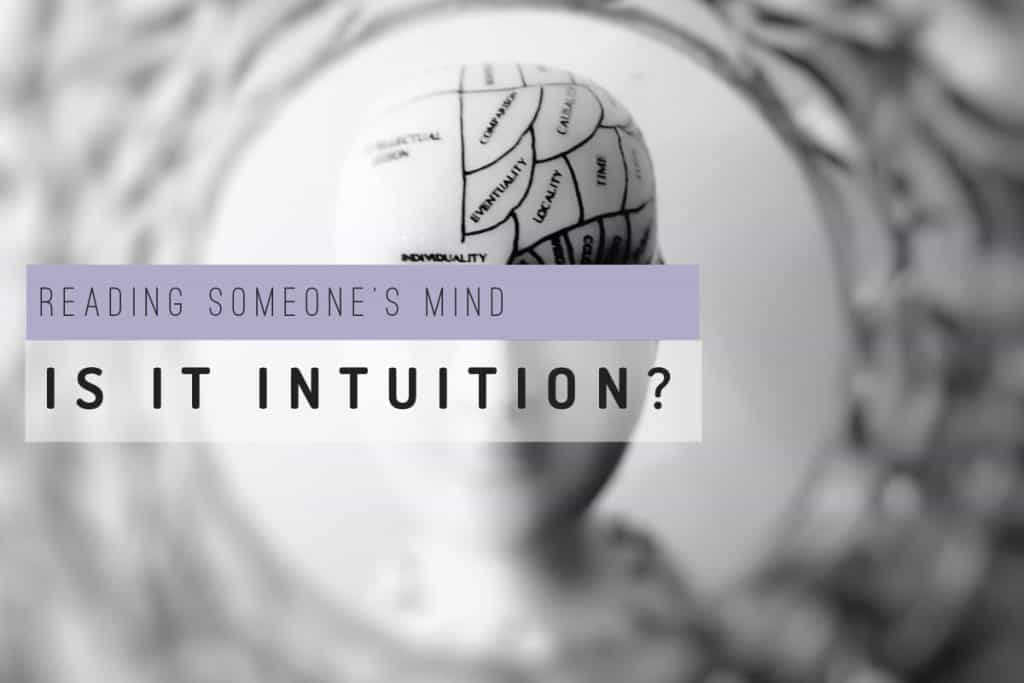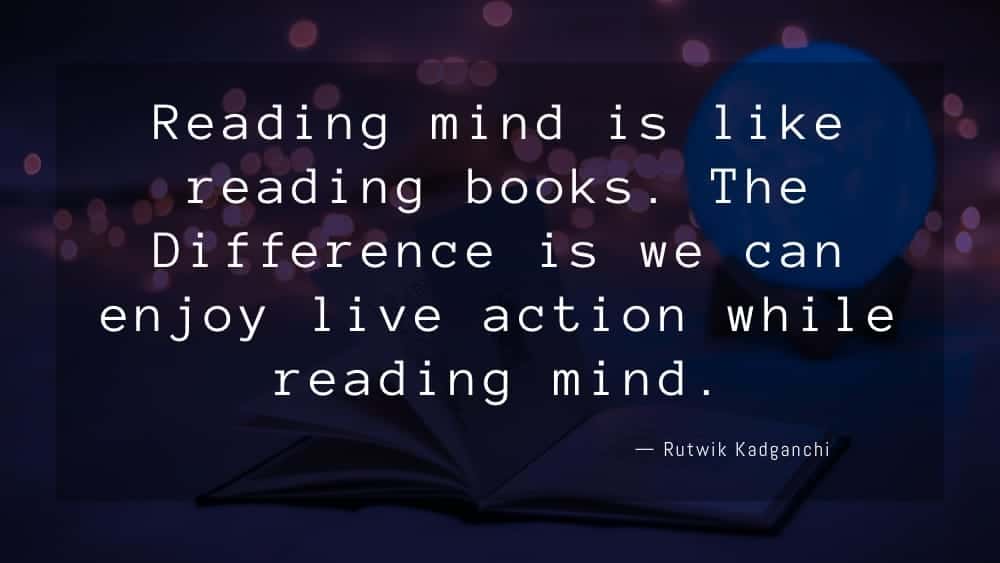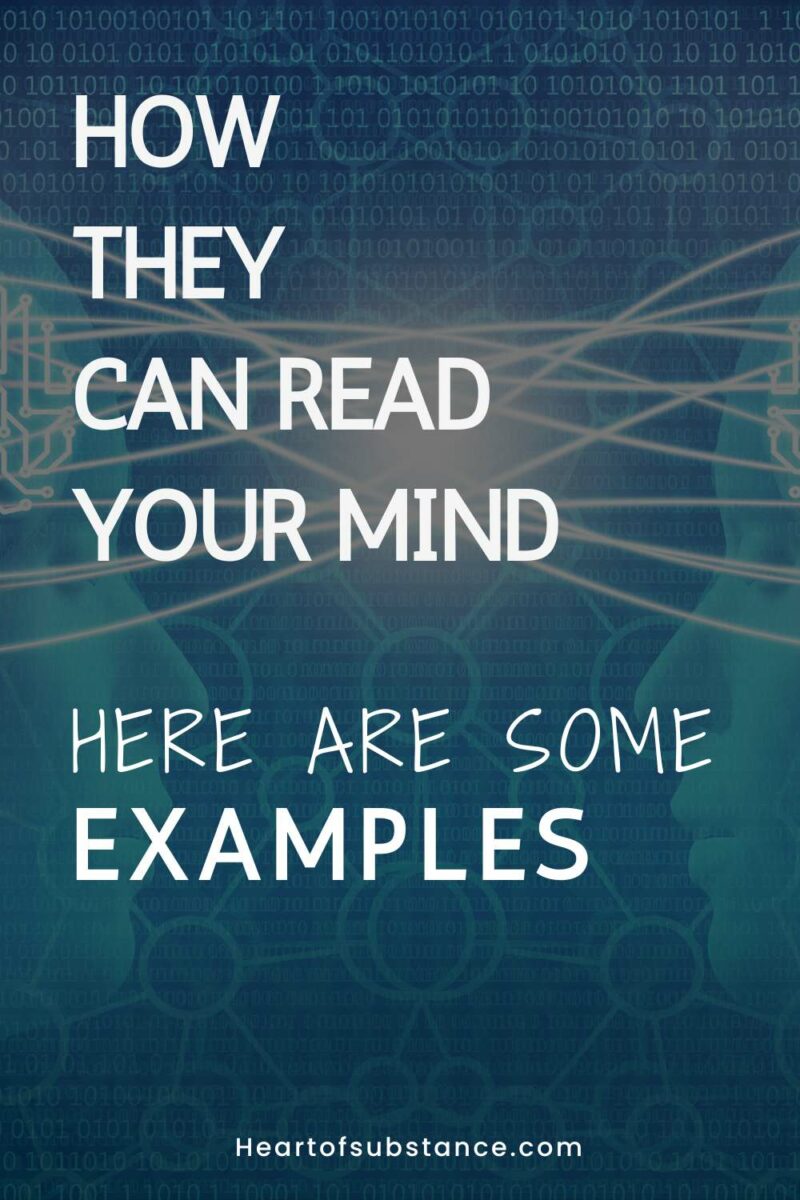Ever had a moment when it seemed like you could read someone’s mind? Or, that another could read yours? The following explores why and describes everyday instances.

Have you every had a ‘knowing’ where you pre-empt what someone is going to do or say or… or where you and one other finish each other’s sentences…and then there’s the thing where someone calls out of the blue like they just read your mind.
What does it mean to read someone’s mind? Cambridge Dictionary defines it as “to know what someone is thinking without being told”.
Did you know that most ‘reading someone’s mind’ phenomenon is about the nonverbal cues and or body language you communicate.
There’s also ‘reading minds’ known as telepathy. This is the stuff of the ‘mentalist’ or a professional ‘mind reader’.
But what is it called when you can read someone in everyday situations without being face to face? My take is it’s intuition…Here are some examples…
Remember that nobody can access your thoughts without your explicit communication, even if they seem to be able to read your mind.
Why is this mind Reading of interest?
This ability is useful in making choices and in personal, family, or work plans, not from the crystal ball gazing perspective of predicting the future, but for working in harmony.
Most of us experience it in some form or another and it is intriguing in different ways, from everyday connections to the entertainment offered by Mentalists.
An everyday experience of mind-reading happens in relationships and is often a bonding experience, but can also raise red flags.
Technology and science are also finding mind-reading useful.
I cover examples and studies further on.
Examples of Reading thoughts – everyday mind reading
Out of the blue someone close mentions what you just thought about.
Do we know each other so well that we know each other’s thoughts? It’s like magic. We finish each other’s sentences. During that time, there’s a sense of belonging, a deep connection, a ‘soul-matism’.
When I’ve been feeling sad and all alone like nobody cares, ouch! Out of the blue, I’d get this call or message from a friend to see how I’m doing. Kinda freaky but nice. Has that happened to you?
What about, when you randomly miss someone and they somehow show up or end up messaging you?
Are there unspoken communications – a connection on a higher level – going on?
It could be just a fluke. You might just guess what a person is thinking.
Or something special…Is this mind-reading powers?
Some see it as a superpower.
You might not think you’re good at mind-reading but then you have these times when you know something is off, or wrong.
You might say “You read my mind” when another thinks alike and shares the same thoughts.
You’re on the same wavelength, so to speak the same vibrational frequency. See my article: What Happens When You Raise Your Vibration?
It may seem like magic.
I had this years back with one of my preschool children parroting my thoughts.
How is this explained? Researcher Anna Papafragou, of the University of Pennsylvania, explains that infants can take into account intentionality cues. They have this ability to go beyond what’s said and retrieve subtle aspects of what was meant.
Papafragou goes on to say “that mind-reading is heavily involved in aspects of vocabulary acquisition” in regard to young children’s communication abilities and shedding light on the human use of mind-reading in successful communication.
What is mind reading in communication?
Mind reading in communication is where you tap into another’s psyche and know the intended meaning as well as ‘just knowing’ what they are going to say or do. It includes nonverbal cues. The words themselves don’t relay the whole meaning.
Being able to ‘read’ people or mind reading in communication helps us interact with others in our personal, social, and work lives.
"You don't use your mind to read the minds of others. You read minds by reading your heart and gut." (psychologytoday.com)
It’s likened to emotional intelligence, in that it is knowing and understanding how another person feels and thinks so that we cater our communication for them to get the best outcome when delivering or receiving a message.
Can people like you and me read minds? Reading minds is an everyday thing. You mightn’t realize it, but when communicating with others, we automatically scan their feelings and reactions. Some of us are better at this or do it more naturally than others. We look for cues in body language, facial expressions, and even past patterns to read the other person.
Relying on cues from past patterns may lead us astray at times. Have you had that? I think it’s harder today with the increasing use of social media platforms. We’re not having the person-to-person interactions to hone these skills but rather social media interaction is laying down cues without body language and facial expressions.
Most of us are conscious of someone’s eye contact.
When someone avoids eye contact with you, past patterns might tell you they’ve got something to hide or are lying.
The thing is that this is not always the case.
I realized this with my experience in communicating with someone from an Australian Aboriginal tribe some time ago. They wouldn’t make eye contact. I found it unsettling because I got this mixed message. On one hand, I sensed the person was authentic, but on the other, this non-eye contact confused me. I discovered thereafter that it was considered culturally disrespectful for the person to look me in the eye. So our reading of people can be misread and we need to continue to evolve our cue archives.
Intuition and mind reading
Sharpening your intuition helps connect nonverbally.
The main thing is the willingness to trust your intuition. You don’t need a crystal ball, divination cards, or a special headdress unless in some way such a medium helps produce a state of mind where your brain activity creates alpha waves.
Relaxation methods, such as mindfulness, help increase alpha waves and are conducive to mind reading. Yoga and meditation are two practices that help with this. Clearing your mind of worries and trivia is crucial. Openness and flexibility to the flow of energy and thoughts prime your mind and make mind-reading that much easier.
What is telepathy and how it works?
Telepathy is “communication with another person by thinking rather than by using words or other signals” – The Cambridge Dictionary defines it this way.
“Telepathy means direct communication from one mind to another” –psychologist F.W. Myers who first coined the term in 1882 gave this definition.
What is it called when you read someone’s mind? If you’re someone with a special skill, a mentalist, or have a special connection, reading someone’s mind is called telepathy. It is one word given to this phenomenon.
How it works is a mystery. A lack of scientific evidence has led to telepathy being placed under pseudoscience. However, science still looks to develop telepathy using technology, as I cover below.
What are the disadvantages of reading someone’s mind?
‘You mightn’t like what you see or get’ is often chimed, alluding to the negative side of reading someone’s mind. It’s about knowing something that could be disturbing, and that you’d feel better or react rationally if you didn’t know.
What happens if you read someone’s mind while they are reading your mind?
So the inference here is that in reading each other’s mind simultaneously, you each counteract the other’s mind-reading. My take here is that mutual reading of minds creates better interaction rather than counteraction. When two people connect on this plane sometimes not even words are needed.
Why do I feel like someone is reading my mind?
You might feel like people can read your mind because they finish your sentences. They take the words right out of your mouth. They say what you think. Their actions agree with your thoughts. The person mirrors you. You josh and say… “So are you reading my mind?”
Has anyone ever had an experience where you have read someone’s mind or someone has read your mind?
You might interpret this as having a deep connection with someone.
You feel a connecting energy or spirit.
Would you need direct line of sight to read someone’s mind?
Maybe. But this doesn’t account for the times someone contacts you out of the blue as if reading your mind.

Let’s refer to studies.
What Do Studies say
Is mind reading a science? There are the fields of psychology and neuroscience with research covering mind-reading.
Is mind reading scientifically possible? Studies using the technology of fMRI and EEG indicate that mind reading is possible, at least from the perspective of metrics of which these instruments are capable.
Psychology
What is the nature of human mind-reading capacity? One psychology field of thought, at least, suggests the nature of human mind-reading capacity has to do with intuition and emphatic accuracy.
According to Psychology Today’s Mind Reading article “Humans cannot literally read the minds of others but can create mental models so as to effectively intuit people’s thoughts and feelings.”
Here we have the understanding of another’s thoughts through intuition being acknowledged.
How would mind reading work in real life scientifically?
According to this psychological field of thought, you pick up cues from the other person with ’empathic accuracy’, which describes the phenomenon of ‘reading’ cues based on the words, emotions, and body language of another and thus, this is how mind-reading works in real life. The Mind Reading in Communication section above covered this.
There seems to be this empath-intuition connection.
Neuroscience
The problem with neuroscience discerning mind reading is that it cannot yet explain the process of thought scientifically, explains Dr Tara Thiagarajan, Chief Scientist at Sapien Labs.
The complexity of thought includes how much memory, conscious awareness, language, and other factors have a role. Plus…Is it unique to humans or do all living organisms or systems in general use it?
The big problem…is it measurable?
As Thiagarajan points out “neuroscientists assume a thought is represented in the electrical activity of the brain” and so research has centred on technology to expand our understanding in this area.
Mind reading technology
Technology being experimented with in the mind-reading area includes fMRI and EEG.
Functional MRI
A 2005 research study showed fMRI can measure human brain activity and allow someone’s mind to be read, as New Scientist reports.
So far this portrays only images – namely, visual patterns. The visual cortex the brain region of visual perception is involved.
In 2009, an article in Scientific American covered the mechanics of mind reading and acknowledged the limitations of this technology: “What the fMRI scanner is picking up is a very noisy, indirect measure of neural activity, and this creates inherent limits on what’s possible.”
Electroencephalogram (EEG)
More recent research, reported by Smithsonian Magazine in 2018, shows the value of EEG as technology for mind-reading. The EEG detects the brain’s electrical activity or brainwaves and EEG results have been used by researchers at the University of Toronto to rebuild near similar images of faces shown to 13 subjects.
The EEG has also been combined with brain-to-computer technology to ‘telepathically’ send very simple information from one person to another in a different part of the world (Grau et al, 2014).
This is a sort of mind-reading or telepathy that depends on using machines. It is not the type we observe. Meaning… it does little to explain the phenomenon we experience in everyday circumstances when people contact us out of the blue as if they read our mind, as an example of others mentioned above.
How intuitive are you?
These questions are for fun and are not scientifically proven to determine psychic abilities. Enjoy the quiz and see what you discover about yourself! If you answer ‘yes’ to all of these you might find you are one of those people with high intuition.
Final thoughts
Seems intuition (vs logic) assists in reading someone’s mind in communication, at least in understanding cues telegraphed by the other person. It seems more than a fluke that you pick up a mental model of what the other person is thinking, according to psychology. Still, the process of thought, and thus this phenomenon, remains somewhat a mystery for hard science, while scientific research focuses on the use of machines to duplicate telepathy and mind-reading.
Sources
Papafragou, Anna (2002). Mindreading and verbal communication. Mind and Language 17 (1-2):55–67.
Journal reference: Nature Neuroscience 2005 (DOI: 10.1038/nn1445 and 10.1038/nn1444 ) (newscientist.com)
Scientific American 2009 – The Mechanics of Mind Reading.
Smithsonian Magazine 2018 – One Step Closer to Mind Reading
Psychology Today – Mind Reading
Grau C, Ginhoux R, Riera A, Nguyen TL, Chauvat H, Berg M, et al. (2014) Conscious Brain-to-Brain Communication in Humans Using Non-Invasive Technologies. PLoS ONE 9(8): e105225.





